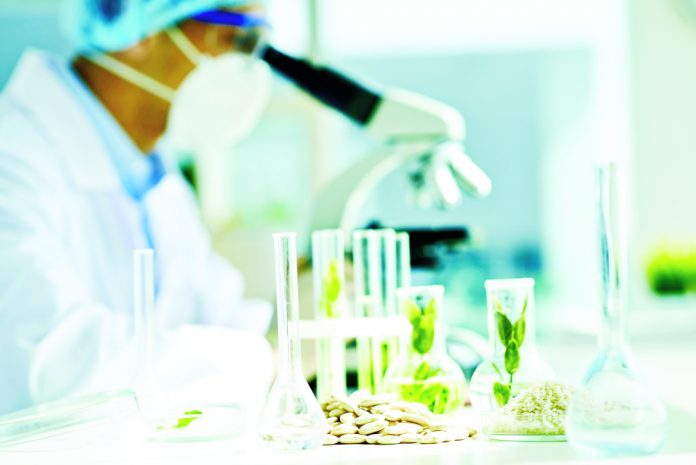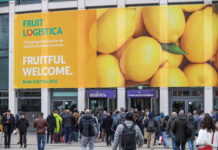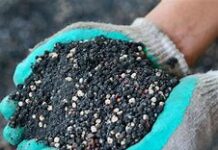How IBM Innovations Will Transform Every Stage of the Food Supply Chain Within the Next Five Years
By Arvind Krishna
Within the next five years, the Earth’s population will cross the eight billion mark for the first time. Our complex food chain—already stressed by climate change and a finite water supply—will only be tested further.
To meet the demands of this crowded future, we will need new technologies and devices, scientific breakthroughs, and entirely new ways of thinking about food safety and security.
IBM researchers around the world are already working on solutions at every stage of the food chain. They are helping farmers maximize crop yields and developing ways to curb the epidemic of waste that destroys 45 percent of our food supply. Our scientists are working to create a safety net to catch pathogens and contaminants before they make people sick. And they’re inventing ways to keep plastic out of our landfills and oceans.
Science Slams give our researchers the opportunity to convey the importance of their work to a general audience in a very short span of time — approximately five minutes. We’ve found this to be an extremely useful exercise that makes our innovation more accessible by distilling it down to its core essentials.
Our researchers inspire us to imagine what else could be possible five years from now. When the eight billionth person is born on Earth, she will enter a world more connected, more interdependent and more responsive to change than the one her parents ever imagined. This is the future that awaits us all.
To meet the demands of this crowded future, we will need new technologies and devices, scientific breakthroughs, and entirely new ways of thinking about food safety and security.
IBM researchers around the world are already working on solutions at every stage of the food chain. They are helping farmers maximize crop yields and developing ways to curb the epidemic of waste that destroys 45 percent of our food supply. Our scientists are working to create a safety net to catch pathogens and contaminants before they make people sick. And they’re inventing ways to keep plastic out of our landfills and oceans.
Science Slams give our researchers the opportunity to convey the importance of their work to a general audience in a very short span of time — approximately five minutes. We’ve found this to be an extremely useful exercise that makes our innovation more accessible by distilling it down to its core essentials.
Our researchers inspire us to imagine what else could be possible five years from now. When the eight billionth person is born on Earth, she will enter a world more connected, more interdependent and more responsive to change than the one her parents ever imagined. This is the future that awaits us all.
Farming’s digital doubles will help feed a growing population using less resources
How do you give a farmer who has never set foot in a bank access to credit? By digitizing and capturing all aspects of agriculture, from the quality of the soil to the skills of the tractor driver to the price of melon sold at the market. It’s known as a Digital Twin, and within the next five years, using AI we can use this data to accurately forecast crop yields, which in turn will give banks and financial institutions the data points they need to provide credit to help farmers expand — maybe money does grow on trees after all.
How do you give a farmer who has never set foot in a bank access to credit? By digitizing and capturing all aspects of agriculture, from the quality of the soil to the skills of the tractor driver to the price of melon sold at the market. It’s known as a Digital Twin, and within the next five years, using AI we can use this data to accurately forecast crop yields, which in turn will give banks and financial institutions the data points they need to provide credit to help farmers expand — maybe money does grow on trees after all.
Spoiler alert: Blockchain will prevent more food from going to waste
Within five years, we’ll eliminate many of the costly unknowns in the food supply chain. From farmers to grocery suppliers, each participant in the supply chain will know exactly how much to plant, order, and ship. Food loss will diminish greatly and the produce that ends up in consumers’ carts will be fresher—when blockchain technology, IoT devices, and AI algorithms join forces.
Within five years, we’ll eliminate many of the costly unknowns in the food supply chain. From farmers to grocery suppliers, each participant in the supply chain will know exactly how much to plant, order, and ship. Food loss will diminish greatly and the produce that ends up in consumers’ carts will be fresher—when blockchain technology, IoT devices, and AI algorithms join forces.
Culture Club: Mapping the microbiome will protect us from bad bacteria
Within five years, food safety inspectors around the world will gain a new superpower: the ability to use millions of microbes to protect what we eat. These microbes—some healthy for human consumption, others not—are regularly introduced into foods at farms, factories, and grocery stores. Thanks to a new technique that enables us to analyze their genetic make-up cost effectively, microbes will tell us a lot about the safety of what we consume.
Within five years, food safety inspectors around the world will gain a new superpower: the ability to use millions of microbes to protect what we eat. These microbes—some healthy for human consumption, others not—are regularly introduced into foods at farms, factories, and grocery stores. Thanks to a new technique that enables us to analyze their genetic make-up cost effectively, microbes will tell us a lot about the safety of what we consume.
Dinner plate detectives: AI sensors will detect foodborne pathogens at home
Within five years, the world’s farmers, food processors, and grocers—along with its billions of home cooks—will be able to detect dangerous contaminants effortlessly in their food. All they’ll need is a cell phone or a countertop with AI sensors. IBM researchers are creating powerful, portable AI sensors that can detect foodborne pathogens anywhere and everywhere they might turn up. These mobile bacteria sensors could dramatically increase the speed of a pathogen test from days to seconds, allowing individuals up and down the food chain to detect the existence of harmful E. coli or Salmonella before it becomes an outbreak.
Within five years, the world’s farmers, food processors, and grocers—along with its billions of home cooks—will be able to detect dangerous contaminants effortlessly in their food. All they’ll need is a cell phone or a countertop with AI sensors. IBM researchers are creating powerful, portable AI sensors that can detect foodborne pathogens anywhere and everywhere they might turn up. These mobile bacteria sensors could dramatically increase the speed of a pathogen test from days to seconds, allowing individuals up and down the food chain to detect the existence of harmful E. coli or Salmonella before it becomes an outbreak.
Plastic Surgery: A radical new recycling process will breathe new life into old plastic
In five years, the disposal of trash and the creation of new plastics will be completely transformed. Everything from milk cartons to cookie containers to grocery bags and cheese cloths will be recyclable, and polyester manufacturing companies will be able to take in refuse and turn it into something useful. This transition will be powered by innovations like VolCat, a catalytic chemical process that digests certain plastics (called polyesters) into a substance that can be fed directly back into plastic manufacturing machines in order to make new products.
In five years, the disposal of trash and the creation of new plastics will be completely transformed. Everything from milk cartons to cookie containers to grocery bags and cheese cloths will be recyclable, and polyester manufacturing companies will be able to take in refuse and turn it into something useful. This transition will be powered by innovations like VolCat, a catalytic chemical process that digests certain plastics (called polyesters) into a substance that can be fed directly back into plastic manufacturing machines in order to make new products.
Arvind Krishna is the Senior Vice President, Cloud &Cognitive Software at IBM.



















